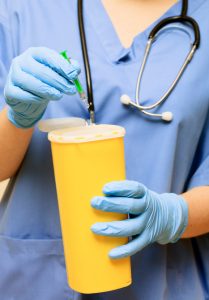Avoid Medical Waste Risks in the Workplace
How does your facility protect workers from medical waste risk?
Healthcare workers are exposed to medical waste risks every day. While their primary focus is on taking care of patients and keeping communities healthy, it’s important for these professionals to make sure that their own health and well-being are also a top priority.
How can healthcare workers avoid medical waste risks?
Hand Washing
One of the most basic preventative measures to take in a healthcare setting is to wash hands regularly and often. The CDC recommends washing hands before procedures, after situations during which microbial contamination of hands is likely to occur, especially those involving contact with mucous membranes, blood or body fluids, and secretions or excretions, after handling specimens, such as urine collection cups, sharps, and blood vials, and after caring for an infected patient.
Using Personal Protective Equipment (PPE)
It’s important to perform a work area assessment to determine the potential hazards and select the appropriate PPE for adequate protection.
Gloves provide a barrier against infection. Gloves do not prevent sharps injuries, but the reduce the risk of contact contamination. They are single use items and are worn for procedures, blood draws, when cleaning up a contaminated space, to name a few.
Eyewear in the form of goggles or visors protects against splatter and foreign bodies during procedures and cleanup.
Masks provide barrier protection against splatter and airborne particles that can contaminate the face.
Using Proper Containers for Medical Waste
Common sense tells us that sharps do not belong in a regular trash receptacle, but you’d be surprised that there are still facilities whose staff improperly dispose of infectious waste. Sharps go in a sharps container, whereas red bag waste should contain anything that is infectious biological material, including blood and blood products, cultures, and culture stocks. This helps keep not only patients healthy, but healthcare workers, too.
Proper Training
While healthcare professionals are trained to do their jobs, education in medical waste disposal and safety is an ongoing process. The EPA and OSHA have resources for healthcare facilities to create a training program that will ensure the safety of workers. Failing to follow protocol and adequately train staff can result in the spread of infection, compromising not only customers and patients, but the environment as well. Protocols are constantly changing, so managers need to ensure that staff are always trained on the latest procedures and preventative measures.
Healthcare workers are not invincible and are more susceptible to medical waste risks given the nature of their jobs. With proper training and abiding by all regulations, those who work hard to take care of us can take care of themselves, too.
How does your facility protect staff from medical waste risks?
Related Articles:
- Handling Medical Waste Containers
- Choosing the Right Sharps Containers for Your Facility
- What Is a Spill Kit? Who Needs Them?
- What Happens to Medical Waste Eventually?

Service Areas: Long Island Medical Waste; New York City Medical Waste; Westchester Medical Waste and more!
